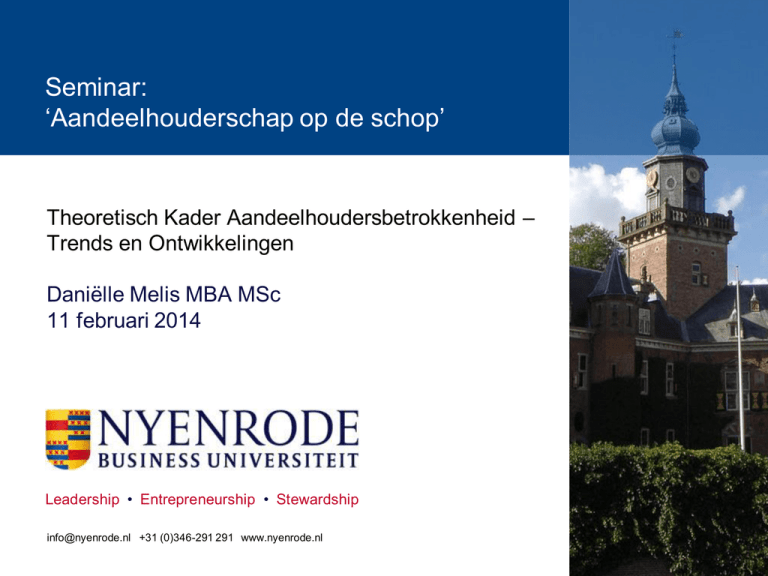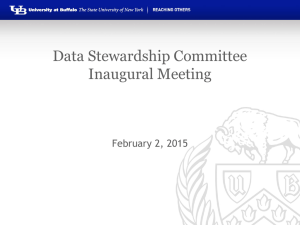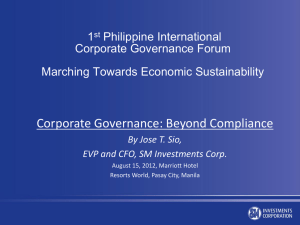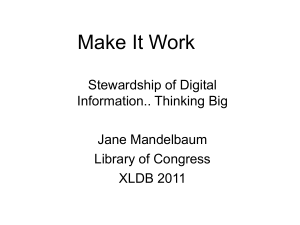presentatie
advertisement

Seminar: ‘Aandeelhouderschap op de schop’ Theoretisch Kader Aandeelhoudersbetrokkenheid – Trends en Ontwikkelingen Daniëlle Melis MBA MSc 11 februari 2014 Leadership • Entrepreneurship • Stewardship info@nyenrode.nl +31 (0)346-291 291 www.nyenrode.nl De driehoek van Corporate Governance Aandeelhouders/ Algemene Vergadering van Aandeelhouders Stewardship Raad van Bestuur Raad van Commissarissen Corporate governance zien als een complex systeem in beweging… ‘…Complexity of relationships seems to be one of the main reasons why corporate scandals still occur’ Mallin, Christine, et al. Corporate governance and complexity theory. Edward Elgar Publishing, 2010. …vraagt om een multidisciplinaire benadering van een nieuw vakgebied De ‘homo teleopathicus’ en de onderzoeksagenda voor ‘behavioral corporate governance’ Artikel in Goed Bestuur & Toezicht 4, 2013 Startpunt voor deze beschouwing Nyenrode onderzoeken tbv Monitoring Commissie 2010, 2011, 2012 en Eindrapport 2013 Een speelveld in beweging… Bron: ‘Overzicht Corporate Governance in Nederland 2003-2013’, eindrapportage Nyenrode (2013) ten behoeve van de Monitoring Commissie Corporate Governance Code … ook internationaal Bron: ‘Overzicht Corporate Governance in Nederland 2003-2013’, eindrapportage Nyenrode (2013) ten behoeve van de Monitoring Commissie Corporate Governance Code De laatste jaren:‘appèl’ aan de aandeelhouder… Lord Myners (2009), UK City Minister ‘…has attacked shareholders for acting like "absentee landlords" and urged them to get more involved with companies they own’ Michael Barnier (2010), EU Commissioner of internal market: ‘…We need to reconsider the role and responsibilities of shareholders’. Green Paper on the EU corporate governance framework (2011): ‘...The corporate governance framework is built on the assumption that shareholders engage with companies and hold the management to account for its performance.’ … De internationale ‘call for stewardship’ Bron: ‘Overzicht Corporate Governance in Nederland 2003-2013’, eindrapportage Nyenrode (2013) ten behoeve van de Monitoring Commissie Corporate Governance Code Maar wat veronderstelt dit ‘appèl’? Shareholders as Owners: Legal Reality Or Urban Legend? April 15, 2010 by Lynn A. Stout: - - - ‘…no human being can own a corporation. In effect, corporations, like human beings, own themselves. As a legal matter, shareholders who purchase shares of stock in a corporation own nothing more than that—shares of stock’. ‘… At law, a principal has a right to control her agent. But shareholders can’t exercise direct control over corporate directors. Moreover, case law describes corporate directors not as “agents” but as fiduciaries with a wide range of discretion, who owe duties not just to shareholders but also to the firm as a whole ‘…It is [thus] wildly misleading to describe shareholders as the sole residual claimants in companies that aren’t actually in bankruptcy’ Is het ‘appèl’ aan aandeelhouders ‘a big bet’? ‘….Policymakers who championed the transfer of enhanced powers to investors went well beyond available knowledge in crafting such a response to the financial crisis. This is perhaps understandable in light of the severity of the 2008 market seizures and the political pressures that arose in their wake. But there is no mistaking that the approach represents, in effect, a big bet that investor institutions can and will exercise rights responsibly, and that such behavior will make markets more sustainable, less prone to error, and more in sync with the interests of capital providers.’ (Ben W. Heineman, Jr. and Stephen Davis, October 2011) Het dilemma: ‘regulation – moral behavior’ ‘…The more we can rely on good governance at the level of the board of directors and effective shareholder engagement, the less we will have to depend on regulation. To put that the other way around, if we conclude that governance and stewardship are deficient, that vacuum will have to be filled by regulation'. (Myners, 2010) Justice Tempered by Mercy - Statue Cumberland Law School Regulation is noodzakelijk? Martin Luther King Jr. on December 18, 1963: ‘…You can’t legislate morals. But we must go on to say that while it may be true that morality cannot be legislated, behavior can be regulated. It may be true that the law cannot change the heart, but it can restrain the heartless.’ … echter vereist zorgvuldigheid? Adam Smith (1776) posed serious accusations at the address of policymakers and regulators (in relation to managers proposing new laws or regulations) by stating: ‘The interest of the dealers, however, in any particular branch of trade or manufactures, is always in some respects different from, and even opposite to, that of the public …. The proposal of any new law or regulation of commerce which comes from this order, ought always to be listened to with great precaution, and ought never to be adopted till after having been long and carefully examined, not only with the most scrupulous, but with the most suspicious attention. It comes from an order of men, whose interest is never exactly the same with that of the public, who generally have an interest to deceive and even to oppress.’ (p. 116) …. het gaat om het gedrag (‘behavior’) ‘…Responsibility for stewardship is shared. The primary responsibility rests with the board of the company… [Institutional] investors in the company … holding the board to account for the fulfillment of its responsibilities.’ (Stewardship Code, 2010) ‘…[in doing so] stewardship is more than just voting. Activities include monitoring and engaging with companies on matters such as strategy, performance, risk, capital structure, and corporate governance, including culture and remuneration. Engagement is purposeful dialogue with companies on these matters as well as on issues that are the immediate subject of votes at general meetings.’ (Stewardship Code, 2010) … institutional investors have not always behaved ‘as desired’ (OECD, 2012, p.9) ‘…[institutional investors] are heterogeneous in terms of their investment style, strategy, time horizon, concentration, size and investor base. More importantly, recent research […] emphasizes their own widely different corporate governance arrangements which leads to differing principal/agent issues and to a distinctive structure of incentives and constraints faced by each’ (p. 21). The OECD study lastly acknowledges the ‘increasing complexity in the investor chain’ (p. 21) and ‘multiple intermediaries in the ownership chain’ (p. 21), referring to the ‘increasing separation of ultimate beneficiaries from ownership rights, and from the investee company’ (p. 21). Kortom, zijn de veronderstellingen ten aanzien van aandeelhouderschap juist? Stout (2012): ‘…shareholder primacy…an ideology, not a legal requirement or a practical necessity of modern business life.’ Handy (2002): ‘…Should the market no longer be king? Success no longer be measured in terms of shareholder value? And profit no longer suffice as an end in itself? Greenspan (2008): ‘..I made a mistake in presuming that the self-interest of organizations is such that they were best capable of protecting shareholders and equity in the firms. Barton (2010): ‘…a shift is needed from ‘quarterly capitalism’ to ‘long term capitalism’ Een vraag die om ander onderzoek vraagt….. Columbus Mijn bijdrage aan dit vraagstuk Promotie-onderzoek D. Melis (verwacht 2014): ‘The Institutional Investor Stewardship Myth; a theoretical, legal and empirical analysis of prescribed institutional investor stewardship in a Dutch context’ Hoofdvraag: Is institutional investor stewardship in respect of Dutch listed companies as prescribed by the Dutch Corporate Governance Code realistic? Een tipje van de sluier……. #1: Een breder theoretisch perspectief The agency theory is most often referred to in the development of corporate governance, providing a theoretical framework ‘in which it most naturally seems to rest’ (Mallin (2009), p. 18). Hansmann and Kraakman (2004) state that ‘…first, it [coporate law] establishes the structure of the corporate form as well as ancillary housekeeping rules necessary to support this structure, and second, it attempts to control conflicts of interest among corporate constituencies, including those between corporate ‘insiders,’ such as controlling shareholders and top managers, and ‘outsiders,’ such as minority shareholders or creditors. These conflicts all have the character of what economists refer to as ‘agency problems’ or ‘principal-agent’ problems.’ #1: Een breder theoretisch perspectief Daily, Dalton and Cannella Jr. (2003) acknowledge that even though the agency theory dominates the corporate governance debate, ‘a multitheoretic approach to corporate governance is essential for recognizing the many mechanisms and structures that might reasonably enhance organizational functioning’ (p. 372). #2 Een breder juridisch perspectief ‘…Overarching principles, internationally accepted but non-binding, attempt to guide investors in their stewardship role, encouraging institutional investors to take up their stewardship responsibilities towards investee companies.’ ‘… institutional investors are likely to take their stewardship responsibility only to the extent that it fits the institutional investors’ primary fiduciary responsibility, i.e., the responsibility of enhancing value for their beneficiaries, and to the extent that differences between legal frameworks facilitate investors should they choose to undertake such responsibility.’ #3 Een gedifferentieerd empirisch perspectief ‘Institutional investors are heterogeneous and – in their behavior as shareholder in respect of investee companies - driven by different investor specific, issuer specific and market specific characteristics’ ‘Institutional investor stewardship’ in Nederland – enkele feiten in ‘form’ > compliance percentages ten aanzien van best practice provision IV.4.4, IV.4.5 en IV.4.6 van de Nederlandse Corporate Governance Code zijn hoog in ‘substance’ > ‘Actual behavior’ in de geest van best practice provision IV.4.4, IV.4.5 en IV.4.6 van de Nederlandse Corporate Governance Code dwingt tot nuancering *) 2010 figures available, but not shown, 2012 not researched Institutional Investors’ Stewardship in ‘form’* *) 2010 figures available, but not shown Institutional Investors’ Stewardship in ‘substance’ Twee onderzoeken: - Exploratief onderzoek naar stemgedrag van institutionele beleggers (2011 perspectief van de beleggers; 2012 perspectief van de beursvennootschappen) - Exploratief nderzoek naar de dialoog tussen institutionele beleggers en beursvennootschappen rondom de AVA 2012 The Dutch landscape Zelfevaluatie institutionele beleggers 30 Zelfevaluatie door beursvennootschappen Stewardship in ‘substance’ kan beter Baroness Hogg, Chairman of the FRC (2012): ‘….there are some signs of a change in [stewardship]behaviour by shareholders and investors [worldwide], …but this is all still by no means the norm, and we cannot afford to stop here.’ IMA survey for FRC 2012 ‘Adherence to the Stewardship Code’ Based on recent Nyenrode research (2012) Jos Streppel, Chairman of the Dutch Monitoring Committee Corporate Governance (2012): ‘…the dialogue seems to develop and improve…. but the role of shareholders needs to be seen into the right perspective [referring to foreign institutional investors].’ Fourth Report of the Dutch Monitoring Committee Corporate Governance Code, december 2012 Stewardship in ‘substance’ kan beter Stewardship in ‘substance’ kan beter Stewardship in ‘substance’ vraagt om multidisciplinair onderzoek Thank you! For questions : d.melis@nyenrode.nl For more information about this topic: ncgi@nyenrode.nl or subscribe to the newsletter of the Nyenrode Corporate Governance Institute via www.nyenrode.nl/FacultyResearc h/corporategovernanceinstitute/P ages/Default.aspx







